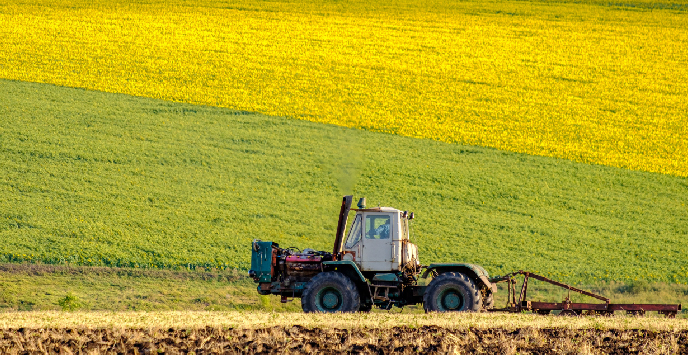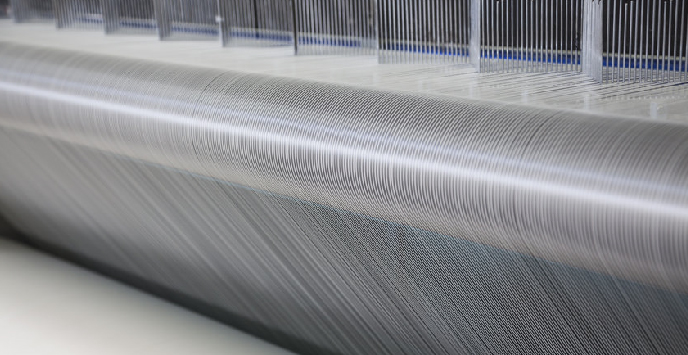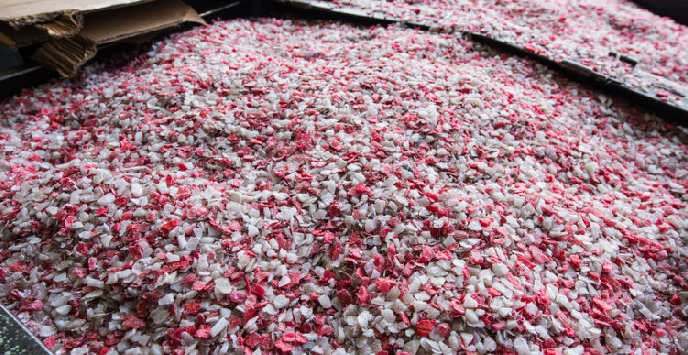Planet: Materials
The materials we use are the consumer’s most tangible experience with our products. Across our brands, we aim to source the most sustainable materials available and accelerate the innovation of materials development. Extraction, processing and production accounts for the largest portion (approximately 70%) of VF’s overall carbon emissions globally.

VF TARGETS & GOALS
01
All cotton purchased by VF is grown in the U.S., Australia or under a third-party cotton growing scheme that promotes environmental and/or social sustainability improvements by FY26.
02
50% of polyester will come from recycled materials by FY26.
Regenerative
The principles commonly used in regenerative agriculture have been in use by indigenous groups and cultures for centuries. One example is rotational grazing, where a grazing livestock herd is rotated among small paddocks for short durations, which stimulates grass growth, naturally fertilizes microbes and allows rainwater to sink into the earth to bolster drought resilience and reduce runoff.
VF and our brands are supporting the development of regenerative supply chains for key materials used in our products. There’s still much to learn about the benefits of regenerative agriculture and how best to quantify these outcomes. Each material is unique, and practices vary by crop, animal and region. To better understand the science, scale supply and source regenerative materials, VF brands are launching pilots across the globe focusing on implementing regenerative practices for leather, cotton, rubber, wool and sugarcane.

Building Regenerative Supply Chains
VF and our Timberland®, Vans® and The North Face® brands are partnering with Terra Genesis International in Thailand to pilot the industry’s first regenerative rubber supply system. Regenerative rubber farming incorporates multiple tree species to mimic a natural forest ecosystem and uses Indigenous farming techniques. It will help to diversify crop yields and provide multiple streams of income to the farming community. Through “train-the- trainer” programs, the brands and VF will transition more plantations to regenerative systems. This initiative is contributing to VF’s efforts to trace the sources of all-natural rubber across all VF footwear brands. The brands’ first regenerative rubber footwear products are expected to launch in 2023 beginning with pilot collections from Timberland® and Vans®. In the spirit of collaborating for the greater good, VF will make this supply system available to other brands across and outside the industry.
RESPONSIBLY SOURCED RENEWABLE
VF takes a holistic approach to sourcing materials to help minimize potential negative environmental and social impacts. Our robust efforts to certify and trace materials help us understand the origins of our materials and how they were produced. Learn more about our robust traceability program here.
Across VF, we use tools such as the Higg Materials Sustainability Index (MSI) and Life Cycle Analysis (LCA) methodologies to identify the greatest opportunities to reduce the environmental impact of our key materials. Through industry partnerships, responsible sourcing standards and investment in supply chain traceability, we are rethinking how we source our materials.
We define responsibly sourced renewable materials as being derived from inputs that naturally replenish in a human’s lifetime and are derived using feedstocks and processing methods that follow proven1 ethical and sustainable practices that minimize harm.

Responsible Wool
Merino wool is a natural and renewable fiber with properties that make it great for natural performance apparel. Across VF, we’re committed to sourcing wool in the most responsible way possible. With two merino-based brands, Smartwool® and Icebreaker®, wool is an important material for VF and achieving our Sustainable Materials Vision.
As of FY2020, more than three-quarters of wool sourced across VF was either recycled or certified to the ZQ Standard or the Responsible Wool Standard (RWS). These standards require sheep be treated ethically during wool harvesting and farmland managed with environmental preservation in mind. And in 2021, Smartwool® and Icebreaker® partnered with the New Zealand Merino Company and peers to launch the world’s first regenerative wool platform. The ZQRX platform will challenge growers to go beyond sustainability and continuously be driven by improvement, to deeply understand the complex interactions between their livestock, soils, climate, ecology and community.
RECYCLED
VF defines recycled materials as those that have been reprocessed from verified, reclaimed waste material by means of a manufacturing process and made into a final material or component.
VF is committed to sourcing 50% of the polyester used for our products from recycled materials by FY26. We are exploring new recycled material sources and investing in recycling technologies to progress towards an aspirational future where materials and products exist in a closed-loop system. By increasing our sourcing of recycled materials, we hope to reduce our climate, energy and water impacts. We are also exploring new and innovative bio-based sources of polyester and nylon that meet and/or exceed consumer expectations.

The Iconic Pack Recycled
In 2020, the Jansport® brand launched their first backpack made with 100% recycled fabric. The Recycled SuperBreak, each containing the equivalent of 20 plastic water bottles (based on a 16oz bottle) worth of recycled plastic, uses 900 Denier Polyester CORDURA® eco fabrics, made of postconsumer waste such as plastic water and soda bottles. The sophisticated recycling technology that creates this eco-conscious fabric breaks down plastic through a manufacturing process and transforms it into high-quality spun polyester yarn. Utilizing these recycled fabrics in product development has a lower impact on climate change than the equivalent virgin polyester.2
Mindful processing and manufacturing of the Recycled SuperBreak is also a key driver of JanSport's sustainability efforts –All the machines used in the production of the Recycled SuperBreak use renewable energy from a solar power system and the eco-conscious fabric produced has a solvent free PU coating, which reduces the amount of hazardous chemicals used during processing.
1VF considers ‘Proven’ to encompass options with strong data vetted by internal teams, 3rd party certifications or LCA data, where applicable. VF responsible sourcing teams verify that all materials choices align with applicable standards and policies.
2All reclaimed material should be verified as waste by a 3rd party certification and/or by our internal processes and supplier data.



